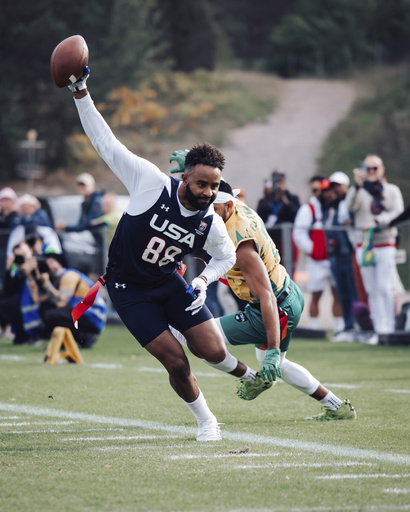
DENVER — If you’ve ever excelled in backyard flag football, played at any tackle football level, participated in track, engaged in basketball, or simply experimented with any sport, this opportunity might pique your interest: USA Football is conducting talent identification camps across the nation, aiming to spot the next great flag football athlete. This initiative combines elements reminiscent of “America’s Got Talent” and “American Idol,” with aspiring players competing for a chance to join a national team. The urgency is clear, as athletes must prepare for the 2028 Olympic Games in Los Angeles, where flag football will feature for the first time.
However, it’s crucial to note that securing a spot on the teams is incredibly competitive. The men’s and women’s national teams have achieved “Dream Team” status, with the men winning six of the last seven world championships, while the women have achieved an impressive three consecutive victories. To maintain this dominance, USA Football is exploring every available football field, park, track, basketball court, and gymnasium to unearth hidden talent that can be nurtured.
USA Football has planned camps and tryouts for participants aged 11 to 23 at various locations nationwide. Upcoming events will take place in several cities, including Dallas, Chicago, Tampa, Los Angeles, and the Boston area, where the culminating event is set to occur at Gillette Stadium, home of the New England Patriots.
The organization has established a partnership with the NFL to enhance flag football through various initiatives and programs. Engagement levels have surged, with social media interactions soaring by 86% since flag football was included as an Olympic invitational sport in October 2023. Furthermore, participation rates for boys and girls aged 6 to 17 reached over 1.6 million last year, according to research from USA Football.
Eric Mayes, managing director of high performance and national teams for USA Football, emphasized the organization’s commitment to excellence: “We pride ourselves on elevating the gold standard across the sport. We want to be the best in the world — and stay the best in the world.” Flag football has recently been added as one of five new sports for the LA28 Olympics, enhancing its already increasing visibility. The event could feature familiar NFL faces; prominent players such as Tyreek Hill and Patrick Mahomes might don a flag belt for a country with which they have connections.
When flag football was confirmed for inclusion in the Olympic lineup, discussions emerged about the potential involvement of NFL players. However, there are logistical challenges to tackle before their participation in the LA Olympics, scheduled to commence on July 14, 2028. A pertinent question remains: will owners allow high-profile players to take time off for the opportunity to compete for a gold medal? As of now, no determinations have been made regarding the status of NFL players for the Olympics.
For the time being, the focus is on expanding the game’s reach. Currently, 13 states have recognized girls’ flag football as a high school varsity sport. Noteworthy progress was seen when the Pittsburgh Steelers and Philadelphia Eagles supported its adoption in Pennsylvania.
Internationally, the sport is gaining traction, as seen with the Japanese women’s team securing third place in the recent world championships. Additionally, Diana Flores, a quarterback from Mexico, has been recognized as one of the top talents globally. “Could flag football globally become the new soccer? That’s something to aspire to,” remarked Stephanie Kwok, the NFL’s vice president of flag football.
It’s important to note that this form of flag football differs significantly from the casual games you might play during holidays or with family—it comes with a steep learning curve. Given the limited team sizes, versatility is crucial. Many national team members are expected to display the kind of multi-faceted skill set reminiscent of Colorado’s standout, Travis Hunter. Traditional defensive tactics like bump-and-run coverage are non-existent, as contact is strictly prohibited.
This shift posed an adjustment challenge for Mike Daniels, a defensive back who participated in a rookie minicamp with the Cleveland Browns in 2017. He recounted his initial struggle with the absence of contact: “If a receiver is running a route, I’m thinking, ‘OK, I can bump him here and there,’ and they told me, ‘No, you can’t.’ I initially found it hard to accept that I was supposed to let him just run.” However, with time, he adapted.
Competition for the Olympic squad promises to be intense, as only ten players will ultimately secure a spot. Prospective team members will need to demonstrate exceptional talent as accolades from institutions such as college All-American or NFL All-Pro are not guarantees for advancement. “I would actually love to see NFL players try out,” Daniels remarked. “But I’m here to prove my ability. I’m not letting someone walk in with a big name just because of their past experiences.”
At home, Bruce Mapp keeps himself agile, practicing his moves to evade “defenders.” His dedication has led him to win four gold medals with USA Football, and now the 31-year-old is focused on achieving more Olympic success in Los Angeles. “Growing up seeing figures like Usain Bolt and Kobe Bryant winning gold medals was inspiring. With the Olympics approaching, that’s my goal,” said Mapp, who also runs a food truck business in the Dallas area.
This mindset is common among those pursuing their Olympic dreams, which is why efforts like the talent camps are in full swing now. “Many believe that the U.S. always excels, but we put in the hard work to earn our victories,” Daniels reiterated. “We don’t stroll in expecting to win; we’re dedicated and determined.”
